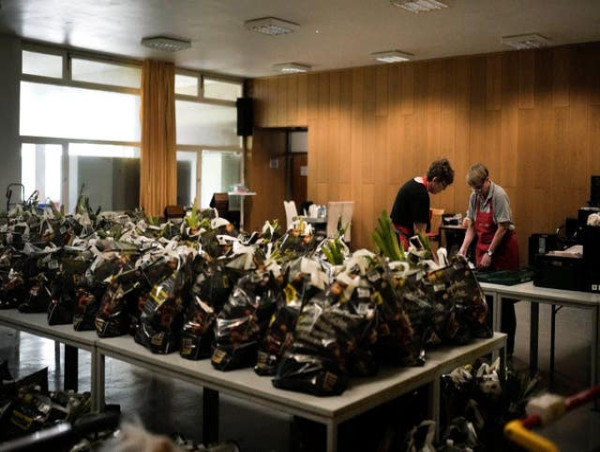Europe sees inflation drop to 6.1% but real relief for consumers will take time

Recent News
"Lorem ipsum dolor sit amet, consectetur adipiscing elit, sed do eiusmod tempor incididunt ut labore et dolore magna aliqua. Ut enim ad minim veniam, quis nostrud exercitation ullamco laboris nisi ut aliquip ex ea commodo consequat. Duis aute irure dolor in reprehenderit in voluptate velit esse cillum dolore eu fugiat nulla pariatur. Excepteur sint occaecat cupidatat non proident, sunt in culpa qui officia deserunt mollit anim id est laborum."
Section 1.10.32 of "de Finibus Bonorum et Malorum", written by Cicero in 45 BC
"Sed ut perspiciatis unde omnis iste natus error sit voluptatem accusantium doloremque laudantium, totam rem aperiam, eaque ipsa quae ab illo inventore veritatis et quasi architecto beatae vitae dicta sunt explicabo. Nemo enim ipsam voluptatem quia voluptas sit aspernatur aut odit aut fugit, sed quia consequuntur magni dolores eos qui ratione voluptatem sequi nesciunt. Neque porro quisquam est, qui dolorem ipsum quia dolor sit amet, consectetur, adipisci velit, sed quia non numquam eius modi tempora incidunt ut labore et dolore magnam aliquam quaerat voluptatem. Ut enim ad minima veniam, quis nostrum exercitationem ullam corporis suscipit laboriosam, nisi ut aliquid ex ea commodi consequatur? Quis autem vel eum iure reprehenderit qui in ea voluptate velit esse quam nihil molestiae consequatur, vel illum qui dolorem eum fugiat quo voluptas nulla pariatur?"
1914 translation by H. Rackham
"But I must explain to you how all this mistaken idea of denouncing pleasure and praising pain was born and I will give you a complete account of the system, and expound the actual teachings of the great explorer of the truth, the master-builder of human happiness. No one rejects, dislikes, or avoids pleasure itself, because it is pleasure, but because those who do not know how to pursue pleasure rationally encounter consequences that are extremely painful. Nor again is there anyone who loves or pursues or desires to obtain pain of itself, because it is pain, but because occasionally circumstances occur in which toil and pain can procure him some great pleasure. To take a trivial example, which of us ever undertakes laborious physical exercise, except to obtain some advantage from it? But who has any right to find fault with a man who chooses to enjoy a pleasure that has no annoying consequences, or one who avoids a pain that produces no resultant pleasure?"
1914 translation by H. Rackham
"But I must explain to you how all this mistaken idea of denouncing pleasure and praising pain was born and I will give you a complete account of the system, and expound the actual teachings of the great explorer of the truth, the master-builder of human happiness. No one rejects, dislikes, or avoids pleasure itself, because it is pleasure, but because those who do not know how to pursue pleasure rationally encounter consequences that are extremely painful. Nor again is there anyone who loves or pursues or desires to obtain pain of itself, because it is pain, but because occasionally circumstances occur in which toil and pain can procure him some great pleasure. To take a trivial example, which of us ever undertakes laborious physical exercise, except to obtain some advantage from it? But who has any right to find fault with a man who chooses to enjoy a pleasure that has no annoying consequences, or one who avoids a pain that produces no resultant pleasure?"
To keep reading, please log in to your account, create a free account, or simply fill out the form below.
Disclaimer
The content, including but not limited to any articles, news, quotes,
information, data, text, reports, ratings, opinions, images, photos, graphics,
graphs, charts, animations and video (Content) is a service of Kalkine Media Pty
Ltd (“Kalkine Media, we or us”), ACN 629 651 672 and is available for personal
and non-commercial use only. The principal purpose of the Content is to educate
and inform. The Content does not contain or imply any recommendation or opinion
intended to influence your financial decisions and must not be relied upon by
you as such. Some of the Content on this website may be sponsored/non-sponsored,
as applicable, but is NOT a solicitation or recommendation to buy, sell or hold
the stocks of the company(s) or engage in any investment activity under
discussion. Kalkine Media is neither licensed nor qualified to provide
investment advice through this platform. Users should make their own enquiries
about any investments and Kalkine Media strongly suggests the users to seek
advice from a financial adviser, stockbroker or other professional (including
taxation and legal advice), as necessary.
The content published on Kalkine Media also includes feeds sourced from
third-party providers. Kalkine does not assert any ownership rights over the
content provided by these third-party sources. The inclusion of such feeds on
the Website is for informational purposes only. Kalkine does not guarantee the
accuracy, completeness, or reliability of the content obtained from third-party
feeds. Furthermore, Kalkine Media shall not be held liable for any errors,
omissions, or inaccuracies in the content obtained from third-party feeds, nor
for any damages or losses arising from the use of such content.
Kalkine Media hereby disclaims any and all the liabilities to any user for any
direct, indirect, implied, punitive, special, incidental or other consequential
damages arising from any use of the Content on this website, which is provided
without warranties. The views expressed in the Content by the guests, if any,
are their own and do not necessarily represent the views or opinions of Kalkine
Media. Some of the images/music that may be used on this website are copyrighted
to their respective owner(s). Kalkine Media does not claim ownership of any of
the pictures displayed/music used on this website unless stated otherwise. The
images/music that may be used on this website are taken from various sources on
the internet, including paid subscriptions or are believed to be in public
domain. We have made reasonable efforts to accredit the source wherever it was
indicated as or found to be necessary.
This disclaimer is subject to change without
notice. Users are advised to review this disclaimer periodically for any
updates or modifications.



